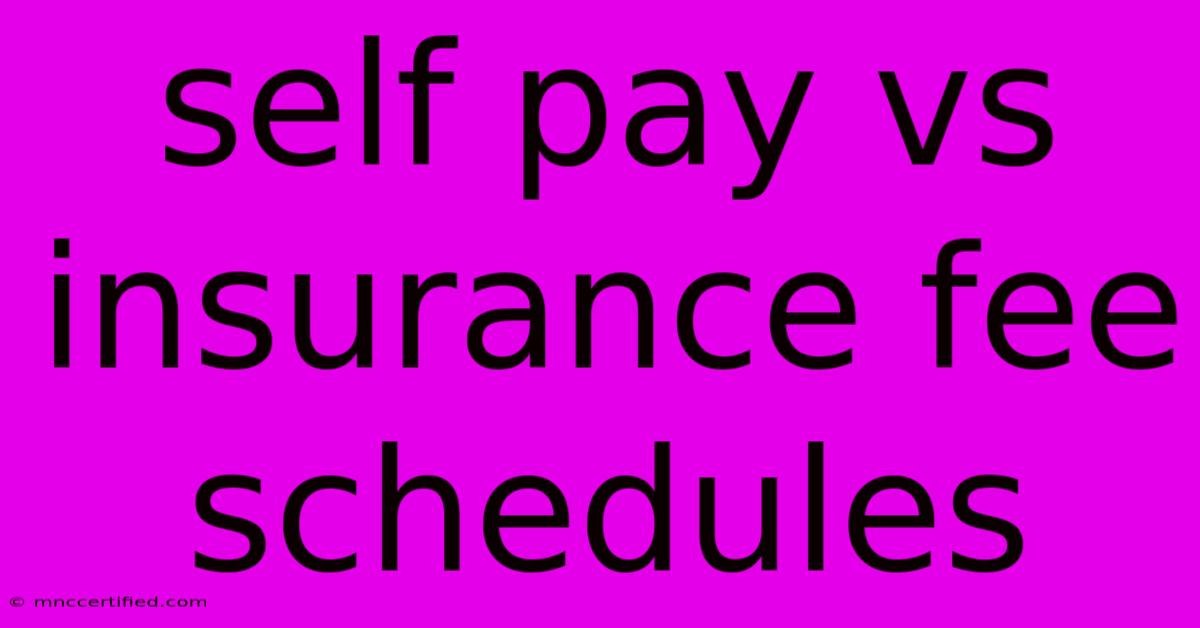Self Pay Vs Insurance Fee Schedules

Table of Contents
Self-Pay vs. Insurance Fee Schedules: Understanding the Costs of Healthcare
Navigating the healthcare system can be overwhelming, especially when it comes to understanding the costs involved. Two key elements often determine the price of your medical services: self-pay rates and insurance fee schedules. While they may seem like similar concepts, they differ significantly and impact your out-of-pocket expenses.
What is a Self-Pay Rate?
A self-pay rate is the price a healthcare provider charges patients who are paying for their services out-of-pocket. This means you are not using health insurance to cover the costs. Self-pay rates are typically higher than insurance fee schedule rates because they don't have negotiated discounts.
What is an Insurance Fee Schedule?
An insurance fee schedule is a pre-determined list of fees that a health insurance company agrees to pay healthcare providers for specific services. These schedules are negotiated contracts between insurance companies and providers, resulting in lower rates than self-pay prices.
Key Differences Between Self-Pay and Insurance Fee Schedules
Here's a breakdown of the primary differences:
| Feature | Self-Pay | Insurance Fee Schedule |
|---|---|---|
| Negotiation | No negotiation | Negotiated between provider and insurance company |
| Rate | Typically higher | Typically lower |
| Payment Method | Out-of-pocket | Through health insurance |
| Flexibility | More flexible, potential for discounts | Less flexible, adherence to pre-determined rates |
Understanding the Implications
- Self-pay: You are responsible for the entire cost of your care. While you may have the option to negotiate a lower price, providers are not obligated to accept your offer.
- Insurance Fee Schedule: Your insurance company covers a portion of your medical expenses, based on the negotiated rates. You pay a copay, coinsurance, or deductible, which is a smaller amount than the total cost.
When is Self-Pay a Better Option?
Self-pay might be a better option in these scenarios:
- Uninsured: If you lack health insurance, you'll need to pay for your medical services out-of-pocket.
- High-deductible plan: You may opt to pay out-of-pocket for small procedures or services if your deductible is high.
- Negotiation: If you can negotiate a significantly lower self-pay rate than the insurance fee schedule, you can save money.
When is an Insurance Fee Schedule Better?
Insurance fee schedules are generally the best option if:
- You have health insurance: The negotiated rates will reduce your out-of-pocket expenses.
- You need significant medical care: Long-term illnesses or complex procedures are more affordable with insurance.
- You value predictable costs: Insurance provides a pre-determined structure for your medical expenses.
Navigating the Costs
- Shop around: Compare costs between providers and inquire about self-pay discounts or payment plans.
- Check your insurance benefits: Understand your coverage, copayments, coinsurance, and deductibles.
- Ask about financial assistance: Many healthcare providers offer financial assistance or payment plans to make services more affordable.
Ultimately, the best choice between self-pay and insurance fee schedules depends on your individual circumstances and financial situation. Understanding the differences and weighing the pros and cons will help you make informed decisions about your healthcare costs.

Thank you for visiting our website wich cover about Self Pay Vs Insurance Fee Schedules. We hope the information provided has been useful to you. Feel free to contact us if you have any questions or need further assistance. See you next time and dont miss to bookmark.
Featured Posts
-
Dukes Loss Flaggs Tough Night
Nov 13, 2024
-
Yorkshires Halifax Sees Surge In Visitors For Rare Bird
Nov 13, 2024
-
Does Insurance Cover Ptosis Surgery
Nov 13, 2024
-
Arsenal 4 0 Juventus Womens Ucl Result And Highlights
Nov 13, 2024
-
Bucks Host Raptors Fiserv Forum Matchup
Nov 13, 2024